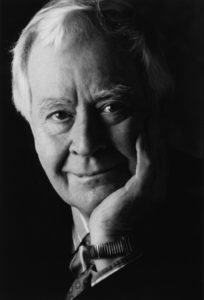Who is Horton Foote?
 Horton Foote was born on March 14, 1916, in Wharton, Texas. He began his career at the tender age of 16, convincing his parents to allow him to go to acting school. He ended up in Pasadena, California, where he studied for two years at the Pasadena Playhouse. He subsequently moved to New York City and studied at Tamara Daykarhanova’s Theatre School, where he was indoctrinated into Michael Chekhov’s version of the Second Studio technique developed at the Moscow Art Theatre. In time, Foote the dramatist would be hailed as the “American Chekhov”.
Horton Foote was born on March 14, 1916, in Wharton, Texas. He began his career at the tender age of 16, convincing his parents to allow him to go to acting school. He ended up in Pasadena, California, where he studied for two years at the Pasadena Playhouse. He subsequently moved to New York City and studied at Tamara Daykarhanova’s Theatre School, where he was indoctrinated into Michael Chekhov’s version of the Second Studio technique developed at the Moscow Art Theatre. In time, Foote the dramatist would be hailed as the “American Chekhov”.
Foote was one of the founders of the American Actors Company. He racked up some minor roles on stage, but decided that becoming a dramatist was his best insurance policy for ensuring he received decent roles. In 1944 he made his Broadway debut with Only the Heart. His fate was sealed when he received better reviews for his writing than for his acting. He wrote extensively throughout the 1940’s and 1950’s, scripting teleplays during the “Golden Age” of television drama for Playhouse 90, The Philco-Goodyear Television Playhouse and The United States Steel Hour.
Most notably, Foote won an Oscar for Best Adapted screenplay for Harper Lee’s To Kill a Mockingbird (1962), which co-starred Robert Duvall in his film debut. Ten years after To Kill a Mockingbird, Duvall and Foote collaborated again for Foote’s adaptation of the William Faulkner story Tomorrow (1972). Foote wrote the screenplay Tender Mercies in 1983 specifically for Duvall, which brought both of them Oscars: Best Original Screenplay for Foote and Best Actor for Duvall. A couple of years later, Geraldine Page would win the Best Actress Oscar for Foote’s The Trip to Bountiful (1985), which also brought him his third Academy Award nomination (best adapted screenplay).
In the 1970s he presented his nine-play cycle Orphans’ Home, based on his family experiences in rural Texas in the early part of the 20th century, and remained active as a dramatist and screenwriter throughout the 1980s and ’90s. In 1995, he was awarded the Pulitzer Prize for Drama for his play The Young Man from Atlanta.
In addition to his Pulitzer Prize and two Oscars, Foote was honored with the William Inge Award for Lifetime Achievement in the American Theatre in 1989, a Gold Medal for Drama from the Academy of Arts and Letters in 1998, the Writer’s Guild of America’s Lifetime Achievement award in 1999, and the PEN American Center’s Master American Dramatist Award in 2000.
Horton Foote’s success has been attributed to his honest examination of the human condition. His central themes of the sense of belonging and longing for home have resonated with audiences for decades; Robert Duvall called him “the rural Chekhov”. One of the leading 20th century chroniclers of small-town American life, Foote’s plays and films are set mainly in and around the same fictitious Texas township, inspired by his birthplace of Wharton. He passed away in 2009 at the age of 92.
